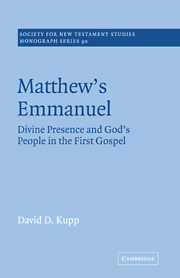Book contents
- Frontmatter
- Contents
- Preface
- List of abbreviations
- 1 Introduction
- 2 Matthew's narrative art
- 3 Reading Matthew's story of divine presence
- 4 Paradigms of presence in the Old Testament
- 5 ‘I am with you’: the Old Testament tradition of the saying
- 6 Matthew 1: the birth of the ‘God-with-us’ Messiah
- 7 Matthew 18.1–20: the presence of Jesus and his έκκλησία
- 8 Matthew 28.16–20: the presence of the risen Jesus
- 9 Jesus' presence and Matthew's christology
- 10 Conclusion
- Bibliography
- Index of passages
- Index of authors
9 - Jesus' presence and Matthew's christology
Published online by Cambridge University Press: 19 January 2010
- Frontmatter
- Contents
- Preface
- List of abbreviations
- 1 Introduction
- 2 Matthew's narrative art
- 3 Reading Matthew's story of divine presence
- 4 Paradigms of presence in the Old Testament
- 5 ‘I am with you’: the Old Testament tradition of the saying
- 6 Matthew 1: the birth of the ‘God-with-us’ Messiah
- 7 Matthew 18.1–20: the presence of Jesus and his έκκλησία
- 8 Matthew 28.16–20: the presence of the risen Jesus
- 9 Jesus' presence and Matthew's christology
- 10 Conclusion
- Bibliography
- Index of passages
- Index of authors
Summary
Who then is Matthew's God-with-us Messiah? Does the first evangelist tie together the various rhetorical and redactional strands we have examined into something which can be called an Emmanuel christology? How do Matthew's new ideas around God's presence help us to understand his story's continuity and discontinuity with Judaism? Several issues require comment for us to answer these questions.
I could start and end by answering the second question with a simple ‘yes’. In a traditional sense we have probably marshalled enough evidence and gospel references to posit the existence of an ‘Emmanuel christology’ in Matthew. Matthew does have a clear interest in identifying Jesus as God with us and in developing the significance of his Emmanuel characterization at key points throughout the story. Emmanuel applied to Jesus is more than a static proper name but is part of Matthew's christology which makes possible his soteriology. For Matthew Jesus' significance as God with us impacts his birth, mission, risen character and postresurrection communities. If we look through the normal categories for NT christology Matthew's Emmanuel is consistent with his other elements of conception christology but reveals no open connection to incarnational or pre-existence christology.
Matthew never openly asserts that Jesus is divine. Although I have used the term ‘divine presence’ continuously in connection with Jesus, it does not require that Jesus is God. But did Matthew's Emmanuel motif breach Jewish orthodoxy about God? It is possible within the Gospel's socio-religious context that the tradition of Jesus' naming as ‘Emmanuel – God with us’ and his Yahwistic ‘I am with you’ declaration were provocative.
- Type
- Chapter
- Information
- Matthew's EmmanuelDivine Presence and God's People in the First Gospel, pp. 220 - 233Publisher: Cambridge University PressPrint publication year: 1996



